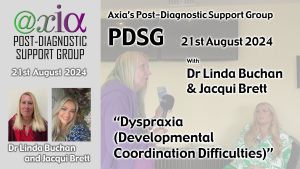Many thanks to Linda and Jacqui who provided some interesting insights into Dyspraxia, a less commonly recognised neurodivergence.
For those of you who couldn’t attend the PDSG, the presentation was recorded and is available to view bellow, along with timestamps and links mentioned in the video.
Timestamps and Links
00:00 Introduction
03:36 Linda demonstrates her own dyspraxia
04:27 Opening slide of joint presentation
05:10 Terminologies
06:48 What are cognitive processes
07:54 Cognitive characteristics of DCD
08:52 Research on DCD
10:19 Planning and Organising
11:43 Processing Information
12:28 Further Resources (links below)
13:07 Systematic Review on studies looking at executive functioning and DCD
16:40 Axia sponsor and attend Chester Pride
18:44 Jacqui discusses “Through an Occupational Therapy lens”
19:04 Gross motor skills
19:45 Fine motor skills
20:28 Associated tests
21:42 Exploring sensory factors and praxis
24:00 Sensory processing and other co-occurring conditions
26:17 Mood, financial and occupational impact
29:28 Strengths and supports
33:35 Closure of Dyspraxia Foundation and Questions
44:45 “In an ideal world”
45:22 Does “Dyspraxia + Environment = Outcome”?
1:06:19 Penny’s PHD research
Some great links include:
Greater Glasglow and Cylde downloadable resources: https://www.nhsggc.org.uk/kids/resources/
NHS Lincolnshire Just Move package https://www.lincolnshirechildrenstherapyservices.nhs.uk/our-services/resource-library/first-move
Understanding the Strengths and Difficulties of Dyspraxia/DCD: A guide for parents https://www.ed.ac.uk/sites/default/files/atoms/files/epic_dcd_parents.pdf
Short illustration -Youtube https://youtu.be/ssfbXEc3tKc
Systematic Review on studies looking at executive functioning and DCD: https://www.ncbi.nlm.nih.gov/pmc/articles/PMC8177544/
Linda Buchans book: http://axia-asd.co.uk/How%20Did%20That%20Happen-Memoirs%20of%20a%20Dyspraxic%20Diagnostician%20for%20web.pdf
Share This Post:









Most interesting, as always! On the strength of this presentation, I believe myself reasonably justified in continuing to self-identify as dyspraxic; additional to diagnosed ASD. Yes, I think I also prefer the word dyspraxia to DCD. But would I be correct in imagining that birth trauma could be a cause of Acquired CD? I am rather glad to hear you consider that there is more to dyspraxia than just physical manifestation. I find myself continually cringing at the memory of both my physical and social clumsiness. But I probably have managed in losing some of that awkwardness over time. That said, not only do I treat dyspraxia as a serious issue, but I also find the cringworthiness of my own dyspraxia quite amusing, and perhaps comedic. I also noted that Linda was slightly interested in the possibility of dyspraxia + environment = outcome, which mirrors my own recent exploration of neurodivergence + environment = outcome. Now I sort of suspect that my early political question at the last PDSG might have led to some editting out of the reactions. From my viewpoint, politics is a distinct part of environment, and so I am naturally interested in how political parties might begin to act on the expert advice they are given. But sorry for my social awkwardness in posing such a tricky question. My own personal dilemma is that politics are contributing to lack of support, but actually I fully realise that as a senior citizen, I really need friendship rather more than support. And the politics where I live abroad (and back in the UK) do obviously interfere with my ability to make friends. All in all, a very thought-provoking presentation for me! See you all again next time!
I was one of the many who believed that Dyspraxia “only” affected movement.
How wrong could I have been!
I found Linda and Jacquis’ presentation invaluable in opening my eyes to the many many ways that this difference affects Dyspraxic people.
As my own son is Dyspraxic, I am very grateful to have a much better understanding of the vast challenges that he faces on a daily basis.
Thank you so much for yet another outstanding PDSG meeting.